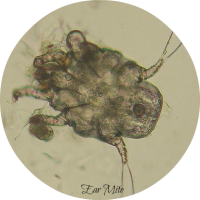Is Ear Mites the Reason Your Dog is Scratching?
By Janice Jones |Last Updated 05-05-2021
There are several types of ear mites that can live in your Shih Tzu’s ear, but the most common are otodectes cynotis. The name comes from the Greek: oto or ear, dectes or biter and cynotis meaning of the dog. This is a common problem in puppies and young adult dogs, but any dog can get them.
When you are cleaning your Shih Tzu’s ears, notice if there is any debris that resembles coffee grinds. If so, you might be dealing with ear mites. Many people think mites when their dog scratches and rubs his head. Not all ear problems, however, are caused by mites, but it is a good idea to rule them out.
Can People Catch Ear Mites from their Dog?
NO
These mites are not those that cause mange.
But they are contagious to other pets but not humans.
If you have more than one pet in the house, the other pets can be infected and should be treated.
These tiny parasites live on the wax and oils found in the Shih Tzu’s ear canal.
 Ear Mite Image |
Although it is nearly impossible to see these mites, an inexpensive otoscope that can be purchased over the counter will reveal tiny white specks among the black debris. You can also see these little creatures by removing a sample of the ear wax using cotton tipped applicator and viewing it under a magnifying glass or microscope. If you do this, you will want to place the cotton tipped applicator on a black surface such as a piece of black construction paper. |
Look for white specks about the size of the end of a
pin that are moving.
These little mites can cause intense itching, irritation and inflammation and lead more serious skin or ear infections if left untreated.
Some dogs scratch and shake their head so vigorously that they break blood vessels on the ear flap, causing the ear to swell with blood.
This is called a hematoma and requires veterinary help. Special medications are used to kill the mites and often the veterinarian will also prescribe antibiotics or other medications to treat secondary infections.
Symptoms
- Rubbing of ears
- Scratching and intense itching
- Shaking of the head
- Black waxy secretions coming from ear
- Bad odor
- Inflammation, redness, swelling in the outer ear
- Black coffee grounds obstruction in ear
Diagnosis
Since these tiny mites are difficult to see with the naked eye, a trip to the veterinarian is recommended.
The veterinarian will be able to identify the mites in the ear canal using an otoscope.
They may also do a smear on a microscope slide and observe the mites under magnification.
Treatment
Specific medications to treat ear mites are available through a veterinarian or over the counter.
Cleaning out the debris prior to administering the ear drops is highly advisable using a cotton ball and cotton tip applicators. The veterinarian may prescribe a good ear cleaner.
If the ear is severely inflamed, the veterinarian may prescribe an anti-inflammatory and/or an antibiotic to relieve the discomfort and treat any secondary infections.
Sometimes the veterinarian will recommend bathing the dog in a pyrethrin based shampoo or using a pyrethrins based flea product such as Revolution.
Caution
Treatment may be lengthy because the life cycle of this mite can last up to 4 weeks. If treatment is stopped before the entire course is completed, infestation is likely to occur. In bad cases, ear mites may escape the ear canal and borrow near the ear causing more itching.
Prevention
Dogs normally come in contact with outdoor cats living in the same household and that is typically how these parasites are spread from one animal to another.
Dogs that spend any amount of time outdoors are susceptible to becoming infected with the mites. Bunnies and Ferrets living in the household are two other pets that are prone to mites and their ears should be checked routinely as well as cats.
To prevent mites from bothering your dog, the best approach is to:
- Treat
all pets in the household at the same time
- Clean ears about every two weeks, including removing any hair that is growing in the ear canal
- Keep household cats indoors
- Keep dogs on monthly medications that treat heartworms and fleas
Products that prevent Ear Mites
If you dog appears to have an ear infection that accompanies the ear mites, this next solution has worked very well for me.
"Hi, I'm Janice Jones, a former veterinary technician and Shih Tzu expert with over 40 years of experience with the breed. Through Miracle Shih Tzu, I combine my medical background and extensive breed knowledge to provide reliable, practical advice for Shih Tzu owners. My mission is to help you give your Shih Tzu the happiest, healthiest life possible through evidence-based information and real-world solutions. Whether you're new to the breed or a seasoned owner, you'll find trusted guidance here for all aspects of Shih Tzu care.
I hold an undergraduate degree in Psychology with a minor in biology, Early Childhood Education, and Nursing, and a Master's in Mental Health Counseling.



